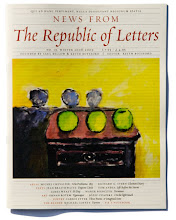In its issue of November 20, the TLS carries a review of Delete by Viktor Mayer-Schoenberger, that raises some very interesting questions about information. It appears that in 2003, researchers at Berkeley sought to estimate how much 'information' had been produced in the previous year. They came up with the figure of five exabytes, which equals 37,000 Libraries of Congress. Delete as you will, that information will continue to live -- for which much gratitude from those whose computers are stolen, fritzed, or screwed up by the excesses of Microsoft. If nothing is lost, you can be sure the FBI and dear old Homeland Security has a copy. Somewhere. Of your rages and kinks and curiosities. It is strongly suggested that you do not look up the ingredients of bombs or how to effect a transfer of money between Akron and Aden.
The author's view -- and I have not yet read the book -- is that we have forgotten the importance of forgetting. Which means that almost anyone can access whatever you have not forgotten, or forgotten thoroughly enough. If you wrote that scurrilous, angry letter to your boss telling him you know how much he pads his expenses, with whom he is currently dallying, and by what schemes he plans to conceal his insider trading, then thought better of it and deleted it, it's still out there somewhere. Has it ever occured to you not to do something because you knew it would come out and be used against you? Women who visit gynecologists always wear clean knickers; we who vent -- unless we are old enough not to care any more what anyone thinks -- might prefer for it not to be known that we had once been fired for a grammatical incorretion. Quelle honnte!
The author's second fear is that too much memory us a dead weight, weighing against change and action. There are and have been people who remember absolutely everything; there is no doubt they wish they didn't. Would you wish to remember the smell of a Mexican oyster that turned out to be bad, or how much toothpaste was left in the tube on May 13th, 1946? The Mayer-Schoenberger view is that we must learn to forget; that we should set 'term-limits' on the digital 'information' we create.
This second problem is the one I find disturbing. Whether or not we will eventully use given memory (photograph, text, etc.) is impossible to predict. As the reviewer says, 'the value of what we keep changes depending in part on what we lose' and 'what we consciously chose to delete may serve to distort the past as what we chose not to delete may distort the future.' I once asked a dear friend how it was that I could not remember much of what I had written or published, and often perforce had to read it all over again. His answer was straightforward: I had forgotten it because I had used it. Having no further direct use for it, off it went.
I think I prefer the sheer happenstance of life: those letters from people you may have known briefly fifty or sixty years ago who see your name somewhere and begin, invariably, with 'You probably won't remember me, but. . .' That 'but' counts.
Lahti
2 years ago













No comments:
Post a Comment